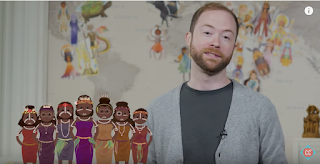Week 14 StoryLab: Crash Course Myth Videos
 |
| Mythology Crash Course |
I learned a lot about things I already knew, such as what mythology is and what it generally entails. However, watching these fundamental videos allowed me to pick up on anything I had missed over the course of the semester. What I found most impactful int he videos was the comparison of myths to the direct expression of its subject-matter that enhances belief and vouches for rituals.
Going into this class I truly assumed that I would deal more closely with Greek and Roman Gods, however, I learned a ton more about society and ancient and modern cultures. Mythology gives us a great window into our past and shows us just how much our modern society mirrors that of our ancient ancestors in terms of lessons learned. I am glad I kind of circled in my understanding of mythology with these final videos.
_________________________________________________________________________________
Below are my notes to the Crash Course Myth Videos:
- what is a myth: Covers many topics
- literature
- history
- anthropology
- sociology
- psychology
- religion
- science
- Many stories may seem familiar, but they are told differently based on the topics above
- if they are different they aren't wrong
- they could just be different versions
- Often interpretations
- the line between myth and religion are often blurry
- stories from the bible are not myths, just they have been used in many ways over a long time
- We often do not know why or why or who originated myths
- has been translated so many different times and ways
- A story that is false and should not be taken seriously
- what myths were described as
- Myth: Mythos
- word or story
- Types of myth
- Creation myths
- how things in the world came to be
- Pantheons
- groups of gods in cultures and how they function in cultures
- flood myths
- heroes from all over the world
- mythical places and creatures
- Religious
- mythology
- ology means the study of
- a systematic study of myths
- didn't take off until 18th and 19th century when they compared a language
- how are they studied:
- been studied a long time
- plato said myths were lies
- myths about gods, heroes were irrational
- psychosocial myths were true that gave morality
- people made stories to make the previous history make sense
- Euhemerism
- using myths to make sense of the natural world
- philosopher
- Logos
- transcendent truth
- Proto-Indo-European
- type of language discovered my analyzing each language from India and around
- saw a lot of different languages had commonalities
- Aryans
- The myth is not symbolic but a direct expression of its subject-matter,
- a narrative resurrection of a primitive reality,
- it expresses and enhances belief, vouches for ritual
- rules for the guidance of man


Comments
Post a Comment